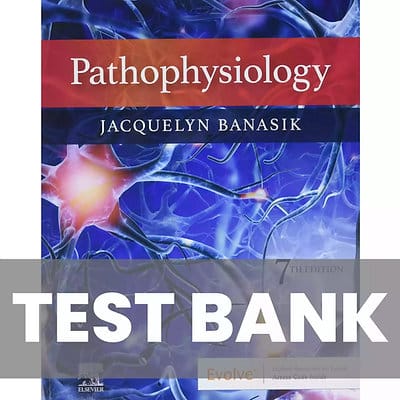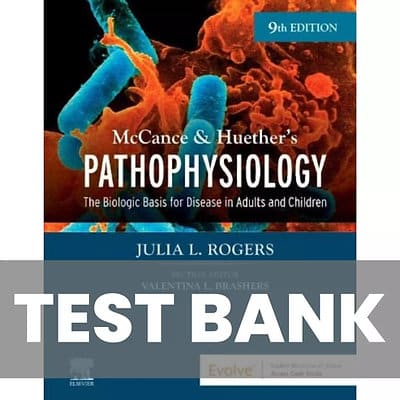Pathophysiology The Biologic Basis For Disease In Adults And Children 8th Edition By Kathryn L. McCance -Test Bank
Chapter 11: Stress and Disease
MULTIPLE CHOICE
1. Exhaustion occurs if stress continues when which stage of the general adaptation syndrome is not successful?
a. Flight or fight
b. Alarm
c. Adaptation
d. Arousal
ANS: C
Exhaustion occurs if stress continues and adaptation is not successful, ultimately causing impairment of the immune response, heart failure, and kidney failure, leading to death. The other stages occur before the adaptation stage.
PTS: 1 DIF: Cognitive Level: Remembering
2. Which organ is stimulated during the alarm phase of the general adaptation syndrome (GAS)?
a. Adrenal cortex
b. Hypothalamus
c. Anterior pituitary
d. Limbic system
ANS: B
The alarm phase of the GAS begins when a stressor triggers the actions of the hypothalamus and the sympathetic nervous system (SNS). The other organs are not stimulated by the alarm phase of GAS.
PTS: 1 DIF: Cognitive Level: Remembering
3. During an anticipatory response to stress, what is the reaction from the limbic system stimulated by?
a. The retronucleus of the anterior pituitary
b. The anterior nucleus of the hippocampus
c. The paraventricular nucleus of the hypothalamus
d. The prefrontal nucleus of the amygdala
ANS: C
The paraventricular nucleus (PVN) of the hypothalamus must be stimulated to cause the limbic system to be stimulated. The other areas are not involved in the stimulation of the limbic system.
PTS: 1 DIF: Cognitive Level: Remembering
4. Which hormone prompts increased anxiety, vigilance, and arousal during a stress response?
a. Norepinephrine
b. Epinephrine
c. Cortisol
d. Adrenocorticotropic hormone (ACTH)
ANS: A
The release of norepinephrine promotes arousal, increased vigilance, increased anxiety, and other protective emotional responses. Epinephrine’s effects are primarily on the cardiovascular system. Cortisol’s chief effects involve metabolic processes. By inhibiting the use of metabolic substances while promoting their formation, cortisol mobilizes glucose, amino acids, lipids, and fatty acids and delivers them to the bloodstream. ACTH binds with specific receptors on the adrenal glands which causes the release of the glucocorticoids.
PTS: 1 DIF: Cognitive Level: Remembering
5. Perceived stress elicits an emotional, anticipatory response that begins where?
a. Prefrontal cortex
b. Anterior pituitary
c. Limbic system
d. Hypothalamus
ANS: C
The perception of stress initiates a series of events in the central and peripheral nervous systems. In the brain, stress elicits an anticipatory response that activates the limbic system; the brain area is responsible for motivation, emotions, and cognition.
PTS: 1 DIF: Cognitive Level: Remembering
6. A student asks the healthcare professional how immunity is decreased by stress. The professional responds that during a stress response, the helper T (Th) 1 response is suppressed by which hormone?
a. ACTH
b. Cortisol
c. Prolactin
d. Growth hormone
ANS: B
Cortisol acts to suppress the activity of Th1 cells, which leads to a decrease in innate immunity and the proinflammatory response. Cortisol also stimulates the activity of Th2 cells, which increases adaptive immunity and the antiinflammatory response. ACTH binds with specific receptors on the adrenal glands which causes the release of the glucocorticoids. Prolactin is secreted in response to a variety of stressful stimuli and acts as a second messenger for IL-2 and has a positive influence on B-cell activation and differentiation. Growth hormone affects protein, lipid, and carbohydrate metabolism; counters effects of insulin; and is involved in tissue repair.
PTS: 1 DIF: Cognitive Level: Understanding
7. Stress-induced sympathetic stimulation of the adrenal medulla causes the secretion of what?
a. Epinephrine and aldosterone
b. Norepinephrine and cortisol
c. Epinephrine and norepinephrine
d. Acetylcholine and cortisol
ANS: C
The sympathetic nervous system is aroused during the stress response and causes the medulla of the adrenal gland to release catecholamines (80% epinephrine and 20% norepinephrine) into the bloodstream. Sympathetic stimulation of the adrenal medulla does not cause the secretion of aldosterone, cortisol, or acetylcholine.
PTS: 1 DIF: Cognitive Level: Remembering
8. A severely stressed patient has cold, clammy skin. The healthcare professional quizzes the student about this effect. The student correctly answers that this effect is directly from which action?
a. Epinephrine dilating blood vessels leading to the vital organs
b. Norepinephrine constricting blood vessels in the skin
c. Dilating the airways to increased oxygenation of the tissues
d. Dysfunctional temperature regulation from cortisol secretion
ANS: B
In a stress response, the actions of norepinephrine and epinephrine are complementary. While epinephrine dilates blood vessels to the vital organs (among other things), norepinephrine constricts blood vessels in the viscera and skin, providing more blood supply for those vital organs. The clinical result is cold, clammy skin. Epinephrine can also dilate airways, but this does not produce the skin changes as described. Temperature dysregulation is not the cause of the cold, clammy skin.
PTS: 1 DIF: Cognitive Level: Understanding
9. Released stress-induced cortisol results in the stimulation of gluconeogenesis by affecting which structure?
a. Adrenal cortex
b. Pancreas
c. Liver
d. Anterior pituitary
ANS: C
One of the primary effects of cortisol is the stimulation of gluconeogenesis through stimulation of the liver. The adrenal cortex, pancreas, and anterior pituitary do not produce stimulation of gluconeogenesis when exposed to cortisol.
PTS: 1 DIF: Cognitive Level: Remembering
10. What effect of increased secretions of epinephrine, glucagon, and growth hormone would the healthcare professional assess for?
a. Hyperglycemia
b. Hypertension
c. Bronchodilation
d. Pupil dilation
ANS: A
Cortisol enhances the elevation of blood glucose promoted by other hormones, such as epinephrine, glucagon, and growth hormone. Increases in glucagon and growth hormone do not lead to increases in blood pressure, bronchodilation, or pupil dilation although epinephrine does.
PTS: 1 DIF: Cognitive Level: Remembering













Reviews
There are no reviews yet.